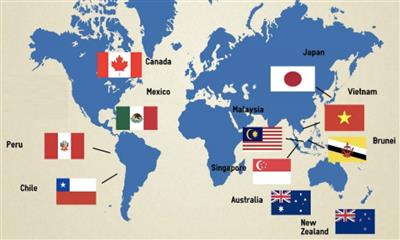TOKYO (Dow Jones) — Negotiators from 11 Pacific Rim nations agreed Tuesday on a Trans-Pacific Partnership trade deal, the Japanese minister in charge of TPP said, a year after President Donald Trump withdrew the U.S. from the talks.
Just as Trans-Pacific Partnership nations seemed ready to leave Canada behind, the nation has reached an agreement to sign the trade pact. Renamed the Comprehensive and Progressive Agreement for Trans-Pacific Partnership, the agreement comes after talks in Japan this week, according to CBC News of Canada.
With Canada now on board, with the approval of its agriculture sector, the TPP 11 agreement is scheduled for a signing ceremony in March. A senior Canadian official says the deal also opens Canada's beef exports to Japan at the expense of America cattle farmers.
U.S.-based National Cattlemen’s Beef Association says the U.S. withdrawal from TPP is a “missed opportunity.” NCBA will have a representative in Canada attending the North American Free Trade Agreement talks later this week. An NCBA spokesperson says: “We encourage negotiators in Montreal to continue building on the progress made in previous rounds so the United States can focus on tearing down trade barriers in Asia and around the world.”
The 11 nations were close to a deal at a summit in Vietnam in November but fell short at the last minute after Canada raised objections.
Negotiators gathered again in Tokyo Tuesday and cleared away the remaining sticking points, said Toshimitsu Motegi, the Japanese minister handling the talks. He said the 11 nations aim to sign the agreement on March 8 in Chile.
Among Canada's issues was its desire for an exemption that it said was needed to protect Canadian cultural products from the effects of free trade. Mr. Motegi said the parties agreed to exchange a side letter with Canada over the issue after the pact goes into effect.
A Canadian official said Canada also secured “real gains” in terms of labor and environmental standards, and applauded the removal of text related to intellectual property. As for automotive rules, the official said Canada has one bilateral agreement with Malaysia on rules of origin, one pending with Australia, and another side deal with Japan regarding nontariff barriers pertaining to motor vehicles.
News of a TPP deal comes as the latest round of trilateral talks aimed at revamping the North American Free Trade Agreement formally began in Montreal on Tuesday. Among the most contentious sticking points is on the automotive front, regarding a Trump administration demand that regional content of light vehicles made in North America be increased to 85{ff5548eb8b7551781742a29b9864cd1703b3791f37ac9790ae42b0c6a6bb7d63} from the current 62.5{ff5548eb8b7551781742a29b9864cd1703b3791f37ac9790ae42b0c6a6bb7d63}, and that half the vehicle's parts be U.S.-made, to qualify for duty-free trade among the countries.
Both Canada and Mexico — which is also part of the TPP pact — oppose the U.S. NAFTA proposal on autos and are preparing counteroffers during the Montreal talks.
News of the pending TPP deal drew immediate concern from Canada's auto-parts makers, who have been focused of late on NAFTA and U.S. proposals that they believe threaten to upend the North American auto supply chain.
“Trophy-hunting trade deals that hurt the biggest sector in Canada is irresponsible and also makes us look weak to the U.S. in a NAFTA week,” said Flavio Volpe, president of the Toronto-based Automotive Parts Manufacturers Association.
The TPP deal came just a half-day after the Trump administration slapped steep tariffs on imported solar panels and washing machines, a move to implement Mr. Trump's harder line on
Japan has depicted itself as a free-trade champion that can assume the kind of leadership role previously taken by U.S. administrations.
“Now in some parts of the world, there is a move toward protectionism, and I think the TPP-11 is a major engine to overcome such a phenomenon,” Mr. Motegi said.
He said the deal was “epoch-making for Japan as well as for the future of the Asia-Pacific region.” He also reiterated a hope frequently expressed by Japanese officials that once the 11-nation TPP is up and running, the U.S. might consider rejoining the deal.
The TPP agreement could also provide a framework for a future NAFTA deal should the current one be scrapped by the Trump administration, according to people familiar with the trade talks. Senior Mexican officials see the TPP agreement as an indication that the free-trade train is rolling forward with regional pacts, with or without the U.S. aboard, as NAFTA is being renegotiated.
Vice President Mike Pence said on a visit to Tokyo last year that as far as the Trump administration is concerned, the TPP is a “thing of the past.”
(AG)
Dow Jones, NAFB and DTN 2017




